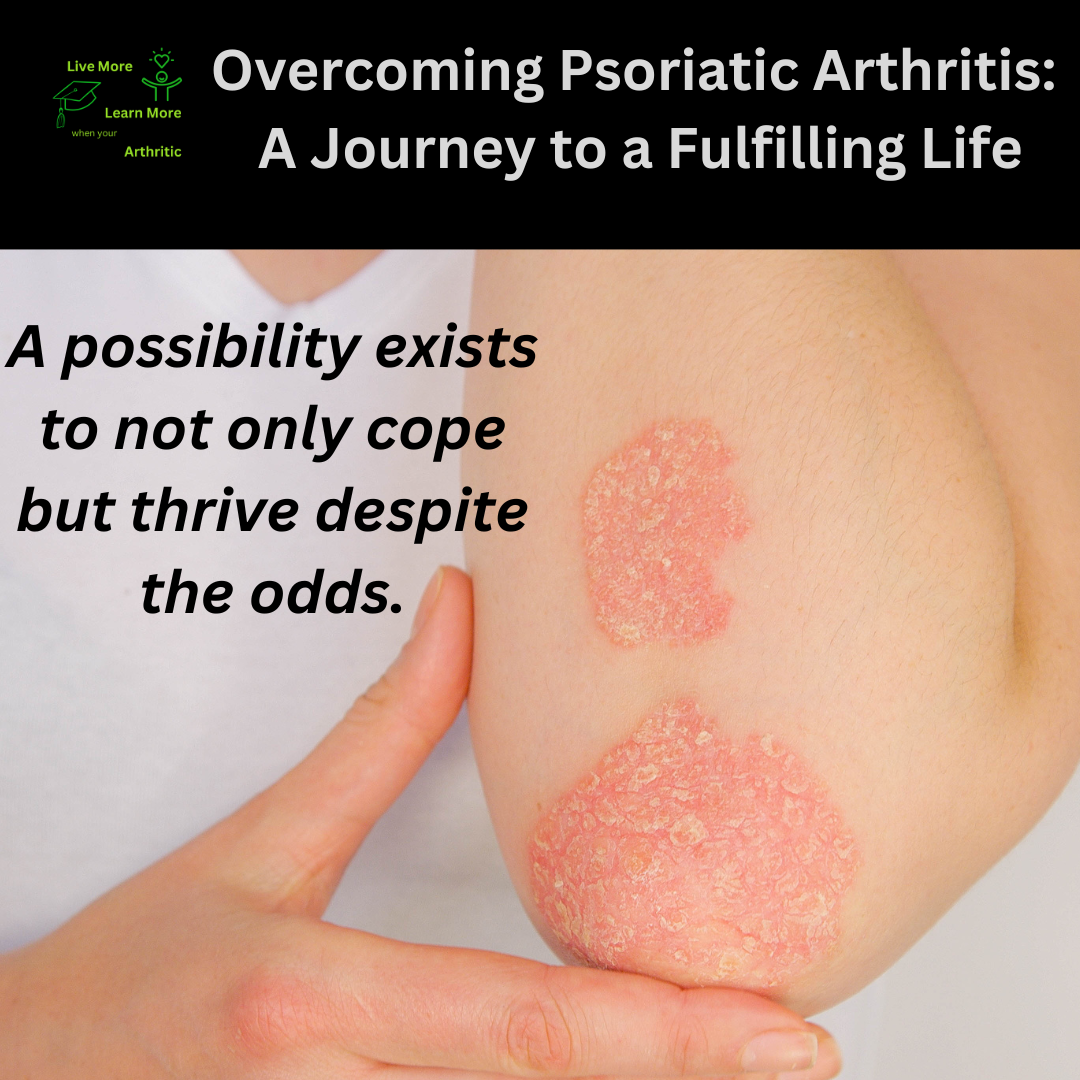
Overcoming Psoriatic Arthritis: A Journey to a Fulfilling Life
Psoriatic arthritis (PsA) is a condition that affects both the body and the mind. It presents unique challenges that can test one’s resilience, but with the right approach, it is possible to manage and even thrive despite the condition.
 Understanding Psoriatic Arthritis
Understanding Psoriatic Arthritis
Psoriatic arthritis is a chronic autoimmune disease affecting the joints and skin, commonly found in people who have psoriasis. The exact cause of PsA is unknown, but it is believed to result from a combination of genetic predisposition and environmental factors that trigger an immune response.
Effects and Symptoms
Psoriatic arthritis can significantly impact mobility and quality of life. Common symptoms include:
- Joint Pain and Swelling: PsA primarily affects the joints, causing pain, swelling, and stiffness, particularly in the morning or after periods of inactivity.
- Skin Changes: Many individuals with PsA have psoriasis, which is characterized by red, scaly patches on the skin.
- Fatigue: Chronic fatigue is common and often results from the body’s immune response and ongoing inflammation.
- Nail Changes: PsA can lead to nail pitting, thickening, or detachment from the nail bed.
- Eye Inflammation: PsA can cause eye inflammation, resulting in redness, pain, and changes in vision.
- Tenderness and Swelling: Inflammation can extend beyond the joints to affect tendons and ligaments, causing additional pain and swelling.
- Morning Stiffness: Many individuals experience stiffness that improves with movement but worsens after periods of rest.
Gut Health and Psoriatic Arthritis
Emerging research highlights a link between gut health and PsA. The gut microbiome, which is crucial in regulating the immune system, can influence inflammation related to PsA. Maintaining a healthy gut through diet, probiotics, and lifestyle changes may help manage PsA symptoms and improve overall health .
Longevity Studies and Psoriatic Arthritis
Psoriatic arthritis can impact longevity due to its association with other chronic conditions. Individuals with PsA have an increased risk of cardiovascular disease, diabetes, and obesity. However, early detection, proactive management, and lifestyle modifications can mitigate these risks and improve overall longevity .
Improving Quality of Life with Psoriatic Arthritis
Living with Psoriatic arthritis requires a comprehensive approach to improve quality of life:
- Medication Management: Collaborate with healthcare providers to find an effective medication regimen that controls symptoms and prevents disease progression.
- Physical Activity: Regular exercise, such as swimming or yoga, can enhance joint flexibility, reduce pain, and boost overall well-being .
- Healthy Diet: An anti-inflammatory diet rich in fruits, vegetables, whole grains, and omega-3 fatty acids can help reduce inflammation and support overall health .
- Stress Management: Techniques such as mindfulness meditation, deep breathing exercises, and engaging in hobbies can help alleviate stress, which can exacerbate PsA symptoms .
- Support Network: Connecting with others who understand the challenges of living with PsA can provide emotional support and practical tips for managing the condition.
Possible Complications of Psoriatic Arthritis
Psoriatic arthritis can lead to several complications, including:
- Joint Damage: Without proper treatment, PsA can cause irreversible joint damage, leading to disability and loss of mobility.
- Cardiovascular Disease: Chronic inflammation associated with PsA increases the risk of heart disease and stroke .
- Osteoporosis: PsA and some medications used to treat it can contribute to bone loss, increasing the risk of fractures .
- Depression and Anxiety: Chronic pain and disability can affect mental health, leading to depression, anxiety, and social isolation .
Conclusion
Psoriatic arthritis presents numerous challenges, but with the right approach, it’s possible to lead a fulfilling life. By prioritizing self-care, seeking appropriate medical treatment, and cultivating a strong support network, individuals with PsA can overcome obstacles and embrace a future filled with hope and possibility.
- Gut Microbiota and Psoriatic Arthritis – NCBI
- Psoriatic Arthritis and Longevity – Mayo Clinic
- Exercise and Joint Health – Arthritis Foundation
- Anti-Inflammatory Diet – Harvard Health
- Stress Management Techniques – American Psychological Association
- Cardiovascular Risk and Psoriatic Arthritis – American College of Cardiology
- Osteoporosis in Psoriatic Arthritis – NIH Osteoporosis and Related Bone Diseases
- Mental Health and Chronic Illness – National Alliance on Mental Illness

